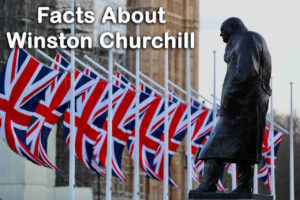8 Facts About Winston Churchill

Winston Churchill
Born October 30, 1874, Full name Winston Leonard Spencer Churchill.
British statesman and author who was the prime minister of Great Britain from 1940 to 1945 and from 1951 to 1955. He was the victor of the Battle of Britain. He was awarded the Nobel Prize for Literature in 1953. He was the son of Lord Randolph Churchill and Jennie Jerome. His father was a politician, and his mother’s father, Leonard Jerome, a wealthy American businessman, played an important part in his upbringing. Churchill began his education at schools in Blenheim (1874-77) and Paris (1877-81), after which he attended Sandhurst Military College (1886). He entered the 4th Hussars in 1891, but he did not enjoy army life, preferring to write about military subjects and to speak on political issues. He published A Brigade of Gurkhas in 1895. Churchill was a war correspondent during the South African War (1899-1902); he later wrote about his experiences in London to Ladysmith (1900). In 1900 Churchill became Conservative member of Parliament for Oldham and held that seat until 1906.
In 1903 he crossed the floor of the House from the Conservative to the Liberal Party. From 1904 until 1915 he served as junior lord of the admiralty under Prime Minister Sir Henry Campbell-Bannerman and subsequently H. H. Asquith. Churchill was responsible for developing the British fleet after the unpreparedness of the navy contributed to Britain’s defeat in the Russo-Japanese War (1904-05).
His book, The World Crisis (6 vol., 1923-31), enabled him to make a political comeback as a Conservative in 1924; he lost his seat but was re-elected in Manchester Central in 1926 and held his seat until he retired from politics in 1964. Churchill rejoined the Conservative government under Prime Minister Stanley Baldwin as chancellor of the exchequer from 1924 to 1929. As chancellor, he helped settle the British Treasury’s war debts to United States banks by negotiating a loan from J. P. Morgan in the United States. Churchill was instrumental in saving the pound sterling from collapse and earned prestige as a national hero in Britain for his spirited defences of the currency during the financial crisis of September-October, 1931. In November he was appointed first lord of the admiralty by Prime Minister Ramsay MacDonald and served until May, 1939. Churchill supported rearmament against Nazi Germany under Prime Minister Neville Chamberlain, but he resigned because he felt that Chamberlain gave too many concessions to Adolf Hitler at Munich in 1938. In June, 1940, Prime Minister Winston Churchill became prime minister and minister of defence. During World War II (1939-45), he led Great Britain’s resistance to Hitler’s invasion. He successfully directed the war effort of his country and his Allies, and he inspired the nation and its allies with his speeches; for this he was called “the man who won the war.” In 1945 Churchill was made an honorary citizen of the United States.
After the development of atomic weapons became known, Churchill advocated a policy of controlled nuclear disarmament. He represented Britain at the conference in Potsdam (July-August, 1945), where final terms for peace with Germany were set. After World War II Churchill served as prime minister from 1951 to 1955, when he retired from politics. In 1953 he was awarded the Nobel Prize for Literature. He wrote 40 books, including My Early Life (1930), Marlborough: His Life and Times (4 vol., 1933-38), The Second World War (6 vol., 1948-53), A History of the English Speaking Peoples (4 vol., 1956-58), and The Story of the Malakand Field Force (1898).
During his retirement, Churchill remained a vital force in international politics. He was the first honorary citizen of the United States and in 1963 was the first non-American to receive the Nobel Prize for Literature. In 1964 he died at his home in London on January 24.
Churchill’s mother, Jennie Jerome, was an American
Winston Churchill’s mother, Jennie Jerome, was an American. She was born in Brooklyn, New York City, and later moved to England with her parents at the age of two. Jennie’s father Leonard Jerome was a wealthy businessman who became a Wall street broker. He made his fortune by “cornering the markets” in things such as wheat and copper. The Jerome family fortune grew to enormous proportions when Jennie’s brother became a partner in the investment banking house of Morton, Bliss & Company
Winston Churchill’s Military Career Started in 1895
Winston Churchill almost didn’t make it into military school because of his poor academic performance. He was one of the most famous leaders of the 20th century, but he only graduated from school in the bottom third of his class. He also had a reputation for being a troublemaker. What if his bad grades had kept him out of military school? After high school, young Winston worked as a reporter for several newspapers. In February 1895, he tried to join the army, but he failed the military entrance exam. He got only 21 out of 72 questions right, in an era before calculators and “multiple choice.”
But Churchill didn’t give up. He tried again a few months later and passed. On September 15th, 1895, he reported for duty at the Royal Military Academy at Sandhurst. He was 17 years old and the youngest in his class of 150 cadets.
Churchill’s Childhood and schooling were insubstantial
The childhood of Winston Churchill did little to suggest his future greatness. His childhood was full of illness, he had a speech impediment and he was not very academic. Winston Churchill was born on 30th November 1874 at Blenheim Palace which is in Oxfordshire. He was born into the powerful Spencer family and thus became part of the aristocracy. His father, Lord Randolph Churchill, was a charismatic politician who had many friends both socially and politically.
Winston’s mother, Lady Randolph Churchill, came from an American family whose wealth could not match that of her husband’s aristocratic family. She had great determination and strong views on how her children should be raised. Winston was educated at home until he was 8 years old when he was sent to a preparatory school called St George’s Court at Ascot. Unfortunately, this school only lasted one year due to difficulties with the school’s headmaster. Winston went on to two more preparatory schools, Blenheim House and then Narrabeen, both of which he left after a short period of time. When Winston had reached the age of 13 it became clear that he would need to be educated in a formal school environment and therefore he was sent to a boarding school called Harrow in London.
At Harrow, Winston was a poor student who had many problems. His academic ability was low for his age and he suffered from several illnesses. He became very naughty and once he even set fire to one of the classroom chimneys. Winston’s rebellious nature led him to become a victim of bullying at Harrow. His father decided that it would be better if Winston went to a different school so he was moved to The Royal Military Academy Sandhurst. Here he had very little success and even became unpopular with his fellow cadets due to his arrogance and lack of respect for authority. Winston’s health was poor at Sandhurst and he had to go to the hospital many times with illnesses such as pleurisy, pneumonia and even appendicitis. His father finally decided that enough was enough and sent Winston away on a cruise to South Africa in order to recover.
Winston’s continued misbehaviour and poor academic results led to his father deciding that a military career was not fitting for someone of his rank so Winston joined the army in 1895. He went on to fight in Egypt, India, Sudan, South Africa and the U.S. During his time in the army Winston wrote several books about British history which were widely read by the public.
In 1953, Winston Churchill received the Nobel Prize in Literature
The Nobel Prize in Literature was awarded to Sir Winston Churchill in 1953 for his mastery of historical and biographical description as well as for his brilliant oratory in defending exalted human values. Despite the fact that Churchill had written works of history and biography, the Nobel Committee specifically cited his “brilliant oratory in defending exalted human values”, as a contribution to literature. This was the first time that a literary prize had been shared; Churchill received the award in Oslo on December 10, 1953. The presentation speech was given by Erik Lodberg.
In his acceptance speech he stated:
I accept this honour with gratitude but without presumption … I must say that I have always looked on literature as a secondary occupation … I could not do what I have done without the leisure that my profession has allowed me.
Professor Erik Axel Karlfeldt was the first member of a Scandinavian university to be awarded this prize. He taught Greek, Latin, French and German at Göteborgs Högre Allmäna Läroverk. (The Senior High School). He was one of the most outstanding critics, describing Churchill as: “A prime minister and a writer”. His speech praised Churchill’s work The Second World War. The Swedish Academy honoured Churchill as “the war-time leader of his people, who with singleness of purpose and highest sense of honour carried his country through its hour of maximum need.
Winston Churchill’s first love was a girl named Pamela Plowden
It’s been said that Winston Churchill’s first love was not his wife, Clementine. Churchill may have indeed fallen in love with her at first sight, but she was not his first love. His true first love was society beauty Pamela Plowden.
The English socialite and daughter of Lord and Lady Plowden was Churchill’s first great love, at a time when he was a young soldier. They had an intense, but short-lived relationship which they were forced to put on hold due to the difference in their stations, as well as family opposition that opposed any relationship between them.
They first met in 1891 when she was just 16, and became engaged in 1895 when Pamela was 20. However, the engagement was called off after Churchill’s mother Jennie strongly objected to the match due to her disapproval of Plowden’s family and elopement with Churchill.
Plowden’s parents were appalled too and disapproved in no uncertain terms. They had been involved in a relationship with Churchill for two years and had already drawn up plans to marry. Churchill was an ambitious young man with aspirations to political power and knew that a marriage to one of the most famous women in England would be a much more prominent match than anything else he could make. He refused to end the relationship.
However, when Jennie Churchill and Plowden’s parents continued to oppose the match, Churchill eventually gave up and wrote to Pamela telling her that their engagement was off. He then told his brother Jack that: “I have made an ass of myself [by] getting into such a hole as this.”
Pamela Plowden did not take the news well, writing back in angry disbelief saying: “I cannot understand why you have broken our engagement. I cannot believe that you have done it seriously. I think it is all nonsense.”
Churchill wrote back to her and told her because of their relationship he was now being shunned by the whole of society, leaving him in a very dangerous position with no choice but to join the army and fight for his country. He had hoped that she would refuse his hand in order to preserve her own reputation in society. But incredibly, Pamela replied to him saying: “I am not going to sacrifice myself and my happiness for anything at all.” She then refused any further correspondence on the subject, effectively ending their relationship.
Churchill created hundreds of artworks
His father and grandfather both painted; however, Winston himself did not begin to paint until he was almost forty year old. Churchill’s interest in art must have begun when he was a very young child; perhaps painting with his parents or his grandfather. However, he later developed this interest through the influence of Prime Minister Sir John Fisher who offered him a position in the Admiralty which would involve naval painting. He received numerous commissions from churches and city councils for large paintings and even designed the decorations for the Royal Albert Hall. Churchill worked for over two years on the painting of the Battle of Omdurman and yet it was destroyed by enemy bombs during 1941.
Churchill found time for painting as well as fulfilling his many other commitments, yet he was not particularly talented at it. Churchill’s friends often gave him advice about his work; they told him to “stick to watercolours” but he still continued with oils, which were more difficult and more expensive.
He made hundreds of attractive, idealized landscapes, but never achieved his goal of becoming a professional artist. Churchill’s early days as an artist were filled with “uncertainty, technical incompetence and extravagant expectations.” His watercolours were described as having a “strong dash of the amateur.”
Art was Winston Churchill’s hobby but it was no pastime. He worked hard on paintings and took them seriously. His works have been exhibited at the Royal Academy during his lifetime, not as a grotesque joke.
Churchill found time to paint, but he seemed to lack several qualities that are needed in order to become a great painter: imagination, sensitivity and invention. He was often criticized for being too literal in his painting; however he did not agree with this himself.
Winston Churchill was not a fan of Mahatma Gandhi
‘a seditious Middle Temple lawyer, now posing as a fakir of a type well known in the East, striding half-naked up the steps of the Vice-regal palace … to parley on equal terms with the representative of the King-Emperor’
Speech by Winston Churchill in Bombay, March 22, 1931, on the eve of his leaving India after a two-year stint as its Governor-General.
Winston Churchill loved onesie
To many, he is a style icon and one of the greatest leaders of his generation. But it seems Winston Churchill had a softer side. The Telegraph has revealed that Winston Churchill invented the ‘onesie’ garment. The term was once defined as “a garment for babies comprising a romper with feet attached” but the term is now widely used to refer to adult pyjamas or onesies.
Read more Facts and Knowledge

